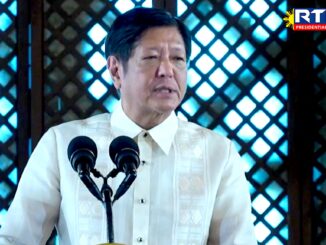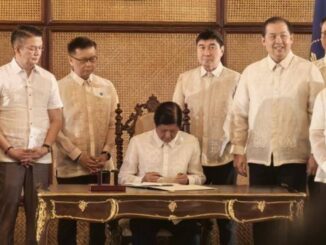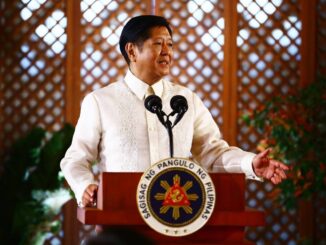
(UPDATES) PRESIDENT Ferdinand Marcos Jr. has appointed Trade Undersecretary Ma. Cristina Aldeguer-Roque as acting secretary of the Department of Trade and Industry (DTI).
Presidential Communications Secretary Cheloy Garafil said on Friday that Aldeguer-Roque would take over the DTI following the resignation of Trade Secretary Alfredo Pascual, which took effect on Friday.
Aldeguer-Roque was DTI undersecretary in charge of the Micro, Small and Medium Enterprises (MSME) Development Group.
NEW APPOINTEE Go Negosyo founder Jose Maria Concepcion III with newly appointed Trade Acting Secretary Cristina Aldeguer-Roque in this undated photo. In a statement on Aug. 2, 2024, Concepcion said President Ferdinand Marcos Jr. ‘could not have picked a better person to lead the Department of Trade and Industry (DTI).’ Then Trade undersecretary Aldeguer-Roque replaced Alfredo Pascual, who resigned after two years of service in the Marcos Cabinet, and said he would return to the private sector. Malacañang said Aldeguer-Roque has been instrumental in leading the MSME Development Group within the DTI, executing various programs and initiatives focused on micro, small and medium enterprises (MSMEs). CONTRIBUTED PHOTO
Garafil said Aldeguer-Roque oversees critical areas, including the Bureau of Small and Medium Enterprise Development, the Bureau of Marketing Development and Promotions, the One Town, One Product Program Management Office, and the Comprehensive Agrarian Reform Program Management Office.
She also manages the operations of the Small Business Corp. and the Cooperative Development Authority.
Garafil said Marcos believed that Aldeguer-Roque was an “excellent choice” as acting DTI head, given her dedication and leadership in the MSME sector.
Aldeguer-Roque earned her bachelor’s degree in Industrial Management Engineering, minor in Chemical Engineering from De La Salle University.
She completed her secondary education at De La Salle Santiago Zobel in Alabang and her primary education at Colegio de San Agustin-Makati and De La Salle Santiago Zobel.
Garafil said the President was expecting a “seamless transition” at DTI.
Pascual was appointed by Marcos as DTI secretary in June 2022 after several years of a successful career in the private sector and serving as president of the University of the Philippines.
In an earlier statement, Pascual said his decision to quit came “after much reflection” as he decided to return to the private sector.
Reflecting on his tenure at DTI, Pascual said he took pride in being able to build a strong pipeline of investments and in implementing consumer protection measures.
He also noted significant progress in the renewable energy sector and initiatives like the suspension of online sales of vape products to protect the youth.
Go Negosyo founder Jose Maria Concepcion III welcomed the appointment of Aldeguer-Roque, saying her “experience as a successful entrepreneur herself comes as powerful credentials for leading the DTI.”
“The President could not have picked a better person” to lead the DTI, said Concepcion, vice chairman of the MSME Development Council.
As undersecretary for the MSME Development Group, Aldeguer-Roque “has proven to be a strong ally of the MSMEs, assisting in whatever way she can in pushing for policies that can benefit this critical sector of our economy,” he added.
Concepcion said Aldeguer-Roque’s appointment also “comes at a time when women are being recognized as a powerful force in business and economy.”
He said Aldeguer-Roque would be the only other woman to lead the DTI since Lilia Bautista in 1992.
“This is definitely a step in the right direction,” Concepcion said.
He thanked Pascual for his service to MSMEs, which make up almost all of the enterprises in the country and generate more than half of the country’s jobs.
Sources, meanwhile, told The Manila Times that the President was considering Marikina 2nd District Rep. Stella Luz Quimbo to head the National Economic and Development Authority (NEDA).
Quimbo, however, laughed off queries by reporters if she was offered the NEDA post.
A political analyst, Dr. Froilan Calilung, said a Cabinet reshuffle could weaken the President’s grip on power ahead of the 2025 elections.
Marcos reportedly aims to replace the heads of “non-performing” government agencies.
Calilung, who teaches political science at the University of Santo Tomas, said a reshuffle in Cabinet might affect “the political stability in governance primarily because this is tantamount to disruption of policy continuity.”
“Whenever there are departures of high-ranking officials, this often disrupts the continuity of the implementation of our key policies and programs, and these officials have typically, should we say, an extensive knowledge and experience regarding their portfolios, and their sudden absence can create a vacuum that hinders the government’s ability to execute its agenda efficiently,” he told The Times in a phone interview.
The changes “would mean delays or possible setbacks in important projects and reforms, which could be perceived negatively by the public,” he said.
Pascual’s resignation came more than six months after former Finance chief Benjamin Diokno returned to being a member of the Bangko Sentral ng Pilipinas’ Monetary Board and turned over the Department of Finance to Sen. Ralph Recto.
Rumors have been swirling that Transportation Secretary Jaime Bautista and Information and Communications Technology Secretary Ivan Uy would also be replaced.
Calilung said the frequent changes in the Cabinet could lead to “a perception of instability with the administration.”
“If voters begin to doubt the administration’s stability, it could weaken the President’s grip on power and influence on public opinion ahead of the midterm elections,” he added.
Cabinet secretaries “are typically seen as, you know, alter egos or extension of the President’s political will. Their resignations might suggest that there are some internal conflicts or a possible lack of confidence in the administration or disagreements on key issues,” Calilung said.
“This can erode the President’s political capital, which would make it more challenging to run support for his initiatives both within the government and among the electorate, particularly in the coming elections,” he said.
Calilung said both the media and the opposition “could leverage on these resignations to criticize the administration.”
“The resignations could impact the coalition of the administration supporting political parties. Cabinet members often play crucial roles, especially to these coalitions. So it could weaken the coalitions, especially those gravitated around the President, because of these resignations,” he said.
Calilung said the Marcos administration “needs to project strength, unity, and enough consolidation in order to strengthen its political base and make an appeal, especially to undecided voters.”
“So any perceived weakness, conflict, disagreement or, let’s say, discord that is happening within the administration may be actually perceived as a weakness on the part of the government of President Marcos,” Calilung said.
The perception could be corrected if the government makes “swift and strategic appointments,” like what happened when Vice President Sara Duterte resigned as secretary of the Department of Education.





Be the first to comment